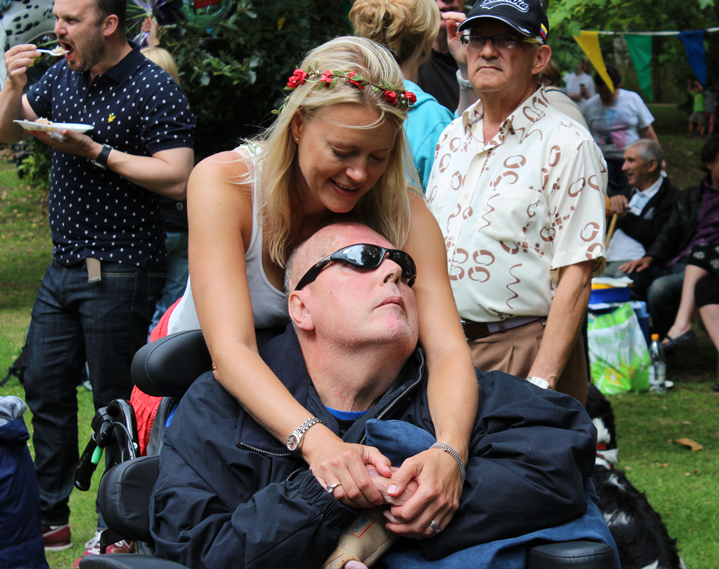-

This week we want to spread the word about writing a Will and remembering a charity
It’s the little things in life that can mean the most. Leaving just 1% of your Will to The Brain Tumour Charity after your loved ones have been looked after can make a world of difference.
-

My bucket list is creating magical memories for my kids
Sarah was diagnosed with brain tumours after the birth of both of her children. She has put together a bucket list and is determined to fill her family’s life with love and laughter.
-

We are proud to announce the appointment of Professor Alan Palmer as our new trustee
Renowned neuroscientist Professor Palmer takes up the role of life sciences trustee.
-

Cancer doctors call for GPs’ increased awareness of chemotherapy effects on teens and young adults
Cambridge University cancer doctors, all associated with Cambridge University have called for improved awareness of long term side effects of chemotherapy treatment.
-

London sees the opening of Europe’s biggest biomedical laboratory
The Francis Crick Institute has just opened next to St Pancras station and the British Library.
-

President Obama appoints world-renown brain tumour professor to US National Cancer Advisory Board
Dr Francis Ali-Osman has been appointed to advise the Government on a wide range of issues relating to the US national cancer programme.
-

Ewan and Kerrie’s story
Kerrie tells us of her joy as her son Ewan starts grammar school after a double brain tumour battle.
-

Google’s DeepMind AI division to analyse brain tumour scans
The Artificial Intelligence (AI) division of Google based in London, DeepMind, will attempt to differentiate between healthy and cancerous tissue by analysing 700 CT and MRI scans from former University College London patients.
-

Molly’s Story
Molly aces GCSE’s whilst battling undiagnosed brain tumour. She receives 7 A*s and 4 As following proton beam therapy in America.
-

Casualty star, Jason Durr backs The Brain Tumour Charity in memory of Ella
Casualty star Jason Durr, is supporting The Brain Tumour Charity after his friend’s daughter Ella Fosbury-Hill, lost her life to a brain tumour in 2013 at the age of 11.
-

Perthshire hosts Family Day for brain tumour families
Crieff, Perthshire will host the fun-filled activity day for children with a brain tumour and their families on Sat 3 September.
-

Charity trustees Andy and Tim walk 500 miles in memory of Joseph
Andy Foote and Tim Burchell, along with friends Mark Roberts and Steve Verrall, have completed the world-renowned 500-mile Camino de Santiago walk across northern Spain, raising over £52,000 for The Brain Tumour Charity.
-

As Casualty back on air with brain tumour storyline – your verdict so far
As Casualty returns to our screens on Saturday (August 27) for its 30th anniversary episode and the new series develops Glen’s brain tumour storyline, we look forward to hearing your views.
-

Lewis Moody is taking on extreme cycle challenge to raise funds for childhood early diagnosis
Lewis Moody MBE is heading up a small, elite team taking on the ultimate charity challenge: The headeast Extreme Cycle Challenge; a 1,000km endurance event from Vietnam to Cambodia, this December.
-

UK firm and King’s College London behind new robot-assisted brain surgery
Stroud-based manufacturing company Renishaw, have installed revolutionary technology at King’s College London that dramatically improves accuracy and patient outcomes.
-

Holly’s story
Actress Holly Matthews tells the heartfelt story of her husband Ross and his diagnosis of a brain tumour. Just this week, Ross underwent a second round of surgery and is now at home recovering well.
-

Zoe’s story
Zoe’s mum Julie lost her life to a brain tumour last year after starting the Heads Up supporter group, which has raised more than £44,000.
-

Scientists further their understanding of how glioma cells adapt and thrive
Scientists from The Wistar Institute in Philadelphia, have discovered how glioma tumour cells adapt to low-oxygen environments in the brain allowing them to continue to grow.
-

Genomics England are now recruiting brain tumour participants
Genomics England are now recruiting for patients with brain tumours to take part in the 100,000 Genomes Project. Genomics promises incredible benefits in healthcare through scientific discovery.
-

Nathan and Hailey’s Story
“We take it in turns to be positive for each other.” When his fiancée Hailey was four months pregnant with their second child, Nathan was diagnosed with a glioblastoma.
-

Thousands surviving for decades after cancer diagnosis… But what about brain tumours?
While a new study reveals people are twice as likely to live at least 10 years after being diagnosed with cancer than at the start of the 1970s, this doesn’t tell the complete story.
-

The Brain Tumour Charity advises top BBC drama, Casualty, on brain tumour storyline
We are delighted to reveal that we have been working with BBC 1’s Casualty on its brain tumour storyline, where Glen is diagnosed with a glioblastoma.
-

Neal and Sara’s story
“Just six weeks after we got together, Neal was diagnosed with a glioblastoma. He said I could leave him, but I wasn’t going anywhere. He was the love of my life.”
Watching Saturday’s episode of Casualty when Glen reveals he has a glioblastoma and tells new girlfriend, nurse Robyn, it’s not fair on her to stay with him, struck a chord with Sara Challice. -

How long does it take to get diagnosed?
For the majority of those diagnosed it takes longer than you’d think. A survey by The Brain Tumour Charity found that more than a third of people with a brain tumour had visited their GP at least five times before they were diagnosed.
Have you been diagnosed with a brain tumour? Order your free information pack.